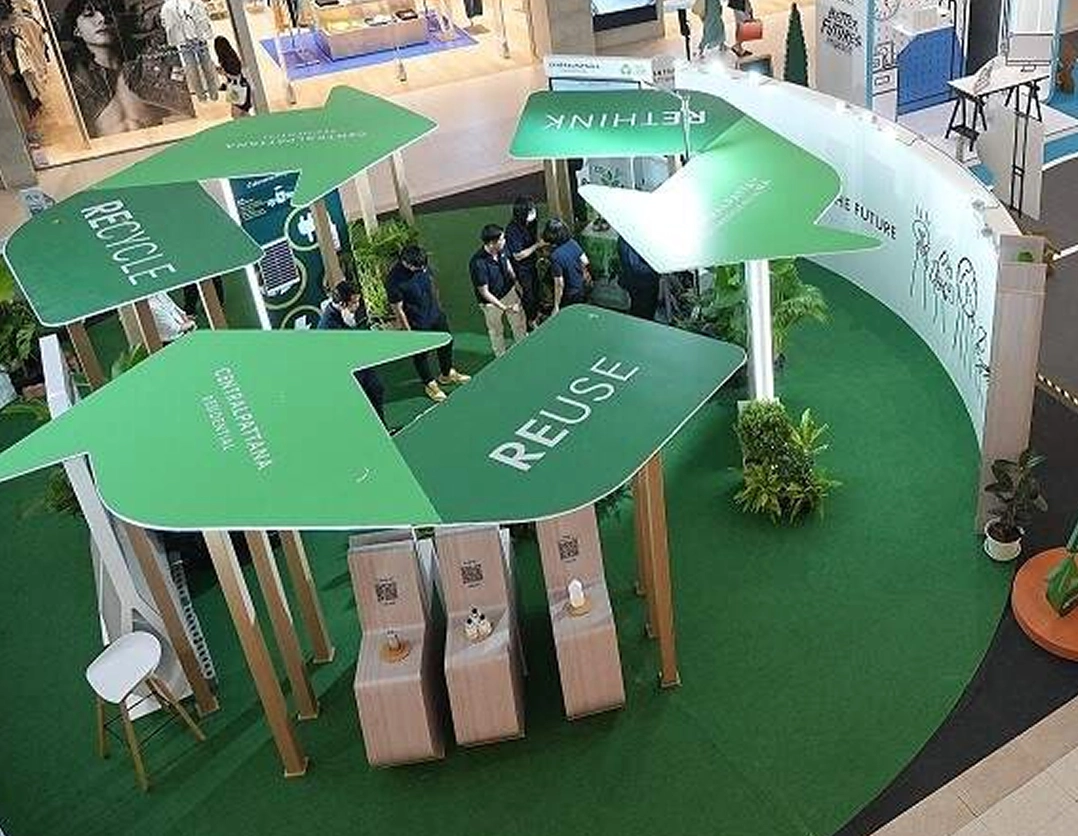
Supply Chain Management
Goal and Performance Highlights

Performance
Goal

Performance
Goal
Challenges and Opportunities
Central Pattana Public Company Limited manages a complex supply chain due to the diversity of its suppliers and contractors, and must continually oversee compliance with the Company’s ethical and sustainability standards. Additionally, managing Environmental, Social, and Governance (ESG) risks across the supply chain, as well as promoting transparency at the sub-supplier level, are critical areas requiring comprehensive attention.
The Company prioritizes the integration of ESG dimensions into its sourcing and procurement strategies and aims to develop a supply chain management approach that emphasizes business continuity, transparency, and resilience to minimize the risk of supply chain disruptions—particularly among strategically significant suppliers.
Moreover, managing and analyzing data across an extensive supplier network is essential for optimizing operational efficiency. Simultaneously, embedding sustainability principles into procurement processes without compromising cost structures remains a strategic challenge requiring balanced management.
Nonetheless, Central Pattana sees opportunities to strengthen collaboration with suppliers, enhancing sustainability performance and reducing environmental impacts through sustainable procurement.
Management Approach and Value Creation
Central Pattana Public Company Limited takes a systematic approach to supply chain management, emphasizing Environmental, Social, and Governance (ESG) principles across all business operations. The Company is committed to increasing transparency, elevating supplier standards, and minimizing environmental impacts.
Supplier Code of Conduct and Ethical Standards
Central Pattana has established a Supplier Code of Conduct covering human rights, safety, and environmental responsibility. All suppliers are required to conduct business with transparency and fairness, in alignment with the Company’s policies. The Code of Conduct references international standards such as the United Nations Global Compact (UNGC), the Universal Declaration of Human Rights (UDHR), and International Labour Organization (ILO) standards.
Supplier Selection and Due Diligence
Central Pattana selects suppliers based on sustainability criteria, placing importance on those with strong ESG performance. The Company conducts due diligence and risk assessments for both short- and long-term exposure, particularly related to environmental, social, and governance risks. Other factors considered include financial stability, strategic importance of goods and services, and crisis resilience capabilities.
Supply Chain Risk Management
The Company categorizes supply chain management into three segments based on the risk profile of value chain processes that could affect revenue generation, disrupt business operations, or vary by business type, to ensure operational flexibility:
-
All new suppliers are required to complete a self-assessment on sustainability through the Company’s online platform. Some supplier groups must undergo additional prequalification assessments, including company credibility and financial management capability, technical expertise and technological innovation, quality management systems, and consideration of safety, occupational health, and environmental impacts, including recognized certifications
-
The responsible department and/or central procurement unit reviews supplier background in Environmental, Social, and Governance (ESG) aspects, including corporate reputation, country risk, industry-specific risk, product/service quality risk, and delivery/service performance risk.
-
Supplier selection is conducted through open bid or electronic auction (e-auction), comparative assessment of three suppliers, evaluating technical capabilities and cost-effectiveness separately, and direct procurement via the e-catalog system for products/services pre-qualified through annual supplier evaluation.
-
Selection criteria include quality, price, service, accuracy of terms, quantity, timing, origin, and delivery location. Additionally, each unit sets a limit on the volume of work per supplier to ensure fairness, avoid monopolization, and diversify operational and delivery risks.
-
Sustainability self-assessment scores are factored into the supplier selection process, weighted between 30% and 100%, depending on the product or service category.
-
All screened and selected suppliers must formally acknowledge compliance with the Company’s Supplier Code of Conduct.
-
Tier-1 Suppliers
- Procurement transactions show high spending value based on spend analysis, and the supplier demonstrates strong financial stability.
- The product or service is critical to the Company’s operations, including strategic importance or the potential to support crisis response.
- The Company has high dependency on the supplier, with limited alternative suppliers in the market.
-
Indirect Key Suppliers
- There are environmental, social, and governance (ESG) risks or opportunities within the supply chain.
- Indirect key suppliers are identified from the list of key suppliers.
In 2024, Central Pattana had 4,479 Tier-1 suppliers, totaling THB 12.71 billion in procurement value. Among these, 129 were identified as key suppliers, accounting for THB 5.992 billion—representing 3% of total suppliers and 47% of total procurement value.
-
Key suppliers are subject to additional sustainability risk assessments based on the following criteria:
- Possession of a sustainability policy aligned with the Company’s direction
- Contract duration exceeding one year
- Potential for strategic collaboration and scalability
- Contributions to innovation, technology, and circular economy practices
- ESG risks or opportunities within the supply chain
- All suppliers are evaluated upon each delivery by the procuring department via QR code scanning within the Company’s procurement system (for purchases through the central procurement unit).
- Key and indirect key suppliers undergo document-based sustainability assessments upon request by the central procurement team and/or relevant units.
- High-risk key suppliers are audited weekly or at defined intervals onsite by the responsible units, with random inspections by senior management. These audits cover construction, production, service delivery, and adherence to fair practices, safety, human rights, and the prevention of negative impacts on subcontractors, workers, the environment, and surrounding communities.
- Key suppliers may also be subject to specialized audits by external experts in safety, traffic impact, environmental and biodiversity impacts, and green building standards, according to international standards and the Company’s Supplier Code of Conduct.
- Some suppliers undergo in-depth audits using primary data at their operating sites to assess delivery reliability, development potential, and readiness for future strategic partnerships.
- Suppliers must develop and complete Corrective Action Plans (CAPs) within defined timelines if they fail to meet assessment criteria. Failure to comply may affect their registration status in the following year.
- Clear disciplinary actions are enforced for violations, particularly concerning safety, according to the Safety Evaluation Checklist and the Company’s rules and regulations.
- Suppliers passing document-based or onsite evaluations are compared with peers in the same product/service category for potential development into strategic business partners. The goal is to mitigate supply chain risks and enhance supplier capabilities based on necessity and readiness.
- Suppliers found in violation of the Supplier Code of Conduct or contractual obligations, or who fail audits, are subject to blacklisting until corrective actions are completed and validated by the responsible department and relevant review committees.
- Supplier registry reviews are conducted regularly by each unit in accordance with the Company’s procurement policies and annual supplier retention assessments.
Process Improvement to Enhance Efficiency and Productivity in Cost Management
The objective of enhancing efficiency and productivity in supply chain management is to enable effective cost control, reduce risks, and increase operational agility. Central Pattana aims to extend value creation across the value chain by reducing costs for tenants, enhancing customer experience to drive repeat visits, and improving the operational efficiency of key suppliers to mitigate their business risks.
Supplier Development and Strategic Partnership Support
Central Pattana analyzes select outcomes from cost efficiency initiatives alongside the assessment results of key suppliers’ capabilities and readiness. This is to develop improvement plans for these suppliers with the goals of minimizing supply chain risks and enhancing operational agility. The company also supports and empowers suppliers to evolve into strategic business partners, enhancing their competitiveness and enabling sustainable business growth.
Relevant business units integrate stakeholder feedback from all relevant groups into their strategic planning, incorporating supplier development into their supply chain improvement frameworks. This ensures a systematic response to operational challenges and supports the establishment of shared operational standards and co-created social value innovations, aligning with the company’s Occupational Health and Safety Policy, Climate and Environmental Policy, and Human Rights and Compliance Policy.
Notable initiatives already developed into standards or implementation models include:
-
Application of Building Information Modeling (BIM)
for digital design simulation in areas such as underground structures, facility management, and retail space design
-
Reuse of cut-off foundation piles
as Recycled Concrete Aggregate (RCA) to replace gravel in temporary roads and road base layers
-
Waste sorting and processing at construction sites,
including introducing and distributing organic compost to communities, feeding food scraps to earthworms, and producing and selling compost, with proceeds used to purchase school supplies for nearby children and site workers. Material reuse practices, such as reusing temporary partition walls and metal sheet roofing, relocating excavated soil to suitable plots within the group’s projects, and repurposing 40 shipping containers for temporary site offices and worker accommodation
-
Installation of solar carports and solar lighting systems covering
50% of the project’s street lighting
-
Use of Construction Online software
to manage on-site modifications, reducing paper usage by 70% compared to the previous system. Providing "Service with the Heart" training to subcontractors handling security and cleaning services
Supplier Performance Monitoring and Evaluation
Central Pattana has implemented a robust supplier performance monitoring system, focusing on ESG compliance to ensure all suppliers meet required standards. Annual evaluations and on-site inspections for high-risk suppliers are conducted. The company targets 100% assessment coverage for both development and operational phases.
Strengthening Supplier Collaboration
The company is committed to transforming suppliers into long-term strategic business partners through training, technology adoption, and the sharing of best practices to enhance their sustainability capacity. Additionally, continuous communication channels are maintained to continuously gather feedback and suggestions from suppliers.
Promoting a Sustainable Supply Chain
Central Pattana leverages technology to strengthen supply chain management. The Vendor Portal is used to manage supplier data, enhance transparency, reduce paperwork, and streamline the procurement process. The company also monitors supplier performance and maintains a structured data system to ensure compliance with defined standards.
Continuous upgrades to the ‘Vendor Portal’ have been implemented, including the development of a real-time performance monitoring platform to enhance accuracy, transparency, and efficiency in supplier data management across the supply chain. Plans are underway to integrate machine learning for supplier risk forecasting to support strategic decision-making and reduce procurement-related disruptions.
Utilizing Technology to Enhance Supply Chain Efficiency
Central Pattana has adopted digital solutions such as the Vendor Portal to improve supply chain operations by:
- Managing supplier data
- Enhancing transparency
- Reducing document workflows
- Improving procurement efficiency
Additionally, performance monitoring systems and structured data storage ensure suppliers comply with required standards.
Operational Strategy for Target Achievement
To achieve supply chain sustainability goals, Central Pattana enforces strict measures and applies technology to improve efficiency. Continuous supplier assessments and development initiatives have led to more than 50% participation from key suppliers in development programs. Control mechanisms are in place to ensure that high-risk suppliers adhere to the company's standards.








